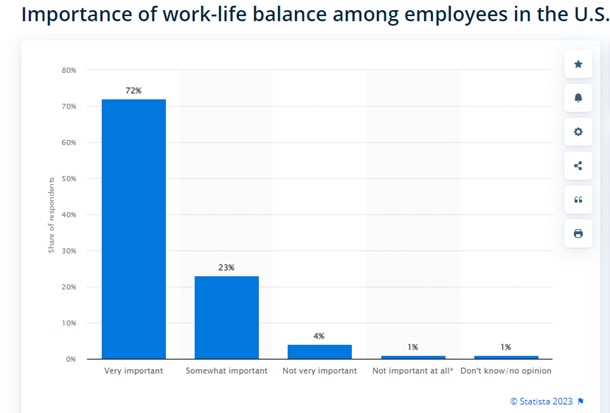Retaining Field Service Technicians: Strategies for Success

Replacing employees has a hefty price tag, given the cost of advertising, recruiting, hiring, and training. An average employee’s departure costs 33% of their annual salary, as per Work Institute.
However, employee retention statistics go beyond mere numbers – they reflect a business’s genuine concern and commitment to keeping its workforce intact. These figures demonstrate the effort invested in preventing employees from leaving.
It’s fascinating to note that loyal employees shoulder up to 80% of the workload, underscoring the immense significance of employee retention.
This understanding is particularly crucial in the field service industry, where the competition to attract and retain skilled technicians is fierce.
To tackle the challenge, companies in the field service industry need to understand and apply the right retention strategies. By implementing effective strategies, they can improve technician retention rates, ensure a skilled and reliable workforce, and ultimately enhance their field service operations.
This blog post will discuss and explore key strategies for retaining field service technicians.
5 Key Strategies To Retain Field Service Technicians
Retaining skilled field service technicians is crucial for the success of any organization. A well-structured workforce capacity planning approach ensures that staffing levels align with business demands, reducing burnout and enhancing job satisfaction. Therefore, implementing effective retention strategies is essential to minimize turnover and maintain a strong workforce. Here are five key strategies that can help companies retain service technicians.
Understand the Field Service Technician Role
A field service technician is a skilled professional responsible for diagnosing and repairing equipment or systems to ensure proper functionality. Their role is crucial in ensuring customer satisfaction and maintaining the smooth operation of various products and services. To be truly effective, technicians must also adopt a customer friendly service mindset, as their ability to communicate clearly, empathize with clients, and provide respectful, solution-oriented support significantly impacts the overall service experience.
Their expertise allows them to identify problems accurately and develop appropriate strategies for repair. This not only resolves immediate concerns but also helps in building trust and loyalty with customers.
Field service technicians require diverse skills and qualifications to thrive in their profession. These include:
- Technical expertise: Proficiency in handling and repairing complex equipment and systems is crucial. In addition, a deep understanding of industry-specific technology is essential.
- Problem-solving abilities: Field technicians must possess strong analytical skills to diagnose issues and develop practical solutions.
- Communication skills: Clear and concise communication is vital for interacting with customers, understanding their needs, and conveying technical information effectively.
- Customer-oriented approach: Providing excellent customer service is crucial to the job. Technicians must be empathetic, patient, and focused on meeting customer expectations.
- Adaptability: Field service technicians often encounter unpredictable situations. The ability to adapt to different environments and handle unexpected challenges is essential.
- Time management: Effective time management skills ensure technicians can complete tasks efficiently, meet deadlines, and prioritize urgent requests.
Unsurprisingly, the demand for skilled field service technicians is high. However, as per Finance Online data, 47% of field service businesses struggle to find qualified technicians and drivers to meet their objectives.
This shortage has prompted organizations to recognize the importance of soft skill training for technicians, with 50% of them ranking it as the top or second most crucial aspect, according to TFE Times. This recognition underscores the importance of technicians’ customer-oriented approach, as it directly impacts customer satisfaction.
As the CEO of FieldCircle, Yogesh Choudhary, says, “Field service technicians are more than problem-solvers; they are brand ambassadors.” When technicians arrive promptly, communicate effectively, and successfully resolve issues, it leaves a positive impression on the customer. Satisfied customers are more likely to recommend the service provider’s services, leading to increased customer loyalty and business growth.
Practical Action Item: Start by understanding field service technician goals. Implement job shadowing and field observations for managers and executives to gain firsthand insights into the field service technician role, challenges, and customer interactions. This hands-on experience will provide a comprehensive understanding of the technician’s responsibilities, allowing for better support and tailored strategies.
Creating a Positive Work Environment
Creating a positive work environment is crucial for retaining field service technicians. By fostering a happy and welcoming workplace, technicians are likelier to stay with the service provider. This can be achieved by treating everyone with kindness and respect, actively listening to their ideas, and fostering a collaborative team environment.
It’s also important to recognize and appreciate the efforts of field service technicians. This means saying “thank you” when they do a good job and acknowledging their hard work. By showing gratitude, technicians will feel valued and encouraged to do their best.
To help technicians grow and become even better at their jobs, it’s essential to provide opportunities for professional development. This could include training programs or workshops that help them learn new skills or improve existing ones. When technicians feel like they are constantly learning and growing, they will be more satisfied with their jobs.
Promoting Work-Life Balance and Well-being for Field Service Technicians
Another critical aspect is promoting work-life balance and well-being. According to a Statista survey, 72% of people looking for a job believe that work-life balance is an essential factor to consider.

This means encouraging technicians to take breaks when needed and ensuring they have time for their families and hobbies. When technicians balance work and personal life, they will be happier and more productive.
Good communication means being able to talk and share information effortlessly. We need to use tools like team meetings, email, and messaging apps to do that. When we use these tools, it helps us work better together and get things done faster. ISE studies show that when businesses use mobility tools, about 75% see their employees do their jobs better, and the others see happy customers. So, it’s essential to have good communication tools to make everyone happy and work well together.
Practical Action Item: Conduct regular check-ins with field service technicians to gather feedback and address their needs. This fosters open communication, improves technician morale, and enhances operational efficiency for customer satisfaction.
Competitive Compensation and Benefits
Paying field service technicians fairly for their hard work and expertise is crucial, considering the question of “How much do field technicians make?” This means offering a competitive salary that aligns with industry standards. In addition, when technicians feel adequately compensated, it boosts their satisfaction and motivation to remain with the service provider.
Moreover, offering attractive benefits packages and perks is crucial alongside a fair salary. This includes providing health insurance, paid time off, and performance-based bonuses. By providing comprehensive benefits, technicians feel valued and supported by the service provider, further enhancing their loyalty and commitment.
Factors for Determining Employee Compensation and Benefits for Technicians
Determining fair and competitive compensation and employee benefits, including technicians, is a critical aspect of talent management for any organization. It involves considering various factors contributing to an employee’s overall compensation package. Let’s understand some of the factors:

Note: The factors listed above are common considerations when determining compensation and benefits for technicians. Companies may consider additional factors based on their industry, market, and organizational needs.
Practical Action Item: To ensure technicians are paid fairly, reviewing their salaries regularly is essential. When technicians see that their pay is being reviewed and adjusted, it shows that the service provider values their contributions.
Highlight opportunities for career growth and financial advancement. This means letting technicians know about potential promotions they can work towards. When technicians see a clear path for advancement, they will be more motivated to stay with the service provider and work hard to achieve their goals.
Effective Training and Onboarding
When new technicians join the team, they must be provided with comprehensive training. This means teaching them everything they need to know to perform their job well. Training can include showing them how to use tools and equipment, explaining service provider procedures, and demonstrating best practices. Technicians will feel confident in their abilities by giving them the knowledge and skills they need.
Moreover, it has been observed by Aquant Service Intelligence Benchmark 2023 report that if every technician had the knowledge and skills to perform like the top 20% of the workforce, service costs would be reduced by 21%. This statistic emphasizes the importance of training and upskilling technicians to improve their performance and efficiency.
Also read: Power of Data Visualization in Field Service
Training should continue after the initial onboarding. Ongoing training is crucial to help technicians enhance their skills and knowledge. This can be done through workshops, online courses, or mentoring programs. By continuously investing in their development, technicians feel supported and motivated to improve.
A Look at Rolls Royce’s Virtual Reality Training for Field Service Technicians
Incorporating technology can make training and onboarding more efficient. For instance, using interactive online modules or virtual reality simulations can help technicians learn in a hands-on and engaging way. Technology can also be used to track their progress and provide personalized feedback.
Rolls Royce, a manufacturer of the world’s largest aircraft engines, is seeking to expand its workforce to meet the growing air traffic demands. As a result, field service technicians play a crucial role in the company’s operations.
As part of their training, technicians engage in virtual reality (VR) courses, allowing them to practice engine attachment and component assembly without needing physical presence or specific locations. VR training offers significant advantages, including enhanced flexibility and efficiency in learning.

Source: Rolls Royce
As we see, offering mentorship and coaching opportunities can be incredibly valuable for technicians. Pairing them with experienced technicians or supervisors who can provide guidance and support can help them grow and succeed in their roles. In addition, when technicians have someone to turn to for advice and encouragement, they will feel more connected to the service provider and its goals.
Evaluating the effectiveness of training programs and seeking feedback from technicians is essential. This can be done through surveys or one-on-one conversations. By listening to their input and making improvements based on their feedback, technicians will feel that their opinions are valued and that the service provider is invested in their success.
Building Strong Relationships with Technicians
To build strong relationships with field service technicians and enhance their engagement, it is essential to establish effective communication and feedback channels. Implementing a bespoke field service management system dramatically facilitates this process. By leveraging such a system, companies can streamline communication, track technician assignments and progress, and provide a centralized platform for sharing information and receiving feedback.
Encouraging collaboration and teamwork among technicians is essential. This means promoting a culture of cooperation where technicians support each other and work together to solve problems. Team-building activities or projects foster a sense of camaraderie and unity. When technicians feel part of a supportive team, they will be happier and more motivated to contribute their best.
Regular performance reviews and constructive feedback sessions help technicians grow and improve. This means providing specific feedback on their strengths and areas for development. By offering guidance and support, technicians can continue to enhance their skills and perform at their best.
Also read: Why should you use field service software
Addressing technician concerns and implementing solutions is crucial for maintaining a positive work environment. This means actively listening to their feedback and taking steps to resolve any issues or challenges they may face. When technicians see that their concerns are being addressed, they will feel valued and supported by the service provider.
Moreover, findings from an SHRM report reveal that a significant majority of HR professionals (68%) acknowledge the positive effect of employee recognition on retention. Recognizing and celebrating individual and team achievements is important to show appreciation for technicians’ hard work. This can be done through simple gestures like saying “great job” or publicly acknowledging their accomplishments. By celebrating their successes, technicians will feel motivated and proud of their contributions.
Conclusion
So, now you know the strategies to retain your field service technicians! Remember, it’s not just about offering competitive pay or attractive benefits. Instead, it’s about creating a positive work environment where technicians feel valued and supported. It’s about providing opportunities for growth and development and promoting work-life balance.
It’s about building strong relationships and effective communication within your team. And most importantly, it’s about recognizing and appreciating the hard work of your technicians.
So, think about these strategies next time you need help to keep your technicians on board. Invest in their training, listen to their feedback, and celebrate their achievements. By taking these steps, you’ll retain your talented technicians and create a workplace where they can thrive and contribute to your business’s success.


